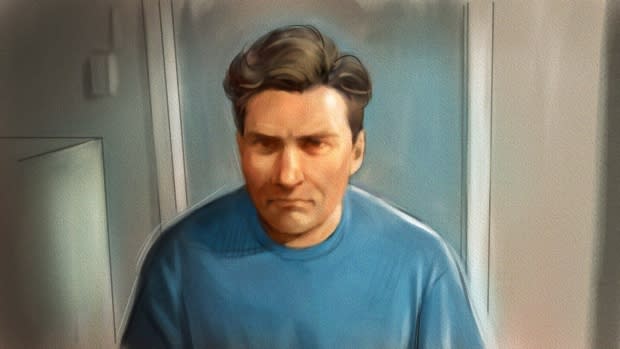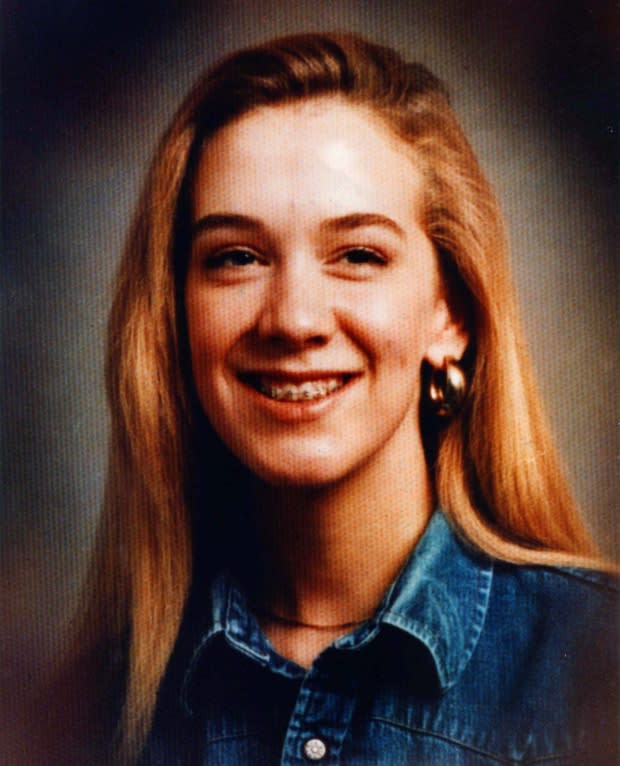Ontario killer and rapist Paul Bernardo denied parole
A National Parole Board panel has decided Paul Bernardo will remain behind bars. The Ontario rapist and killer was denied Wednesday in his first attempt at getting parole.
The decision was announced soon after the mothers of two of Bernardo's victims and a woman who survived an attack read impact statements to the panel, and Bernardo spoke.
Debbie Mahaffy told the hearing that today has been an "emotional hell" for her, because she had to be in the same room as her daughter's killer.
"I don't want to be here," Mahaffy said at the hearing in Millhaven Correctional Centre, east of Bath, Ont. "I do not want to be in the same room [with Bernardo]. I do not want to participate. Yet, here I am."

Bernardo is serving a life sentence for the kidnapping, rapes and first-degree murders of two teenaged girls in the early 1990s, including Mahaffy's daughter, and two counts of aggravated sexual assault.
The designated dangerous offender had been eligible for full parole since February, having served 25 years behind bars.
Leslie Mahaffy was 14 years old when she was kidnapped, tortured and killed in June 1991 at the Port Dalhousie, Ont., home of Bernardo and his then-girlfriend, Karla Homolka. They then dismembered her body, encasing her remains in cement and dumping them in a nearby lake.
"We have to relive Leslie's pain and horror," Mahaffy said. "Our pain and horror ... as if it happened yesterday."

Donna French's daughter, Kristen, was 15 when she was kidnapped by Bernardo and Homolka and tortured for three days, before she was killed.
French told the hearing that Bernardo should never see freedom again.
"How does one describe such immeasurable pain so as to give even the slightest understanding of the overwhelming sadness, the emptiness, and pain we feel even after 26 years of dealing with our loss?" French said.
She also noted that the law was changed after Bernardo's incarceration to allow for consecutive periods of parole ineligibility.

The CBC's Ron Charles watched the parole hearing via video feed with other members of the media in a room at the Bath medium security prison. Bernardo is incarcerated at nearby Millhaven, a maximum security prison, which is where the hearing took place.
He reported the two mothers read their statements from behind Bernardo, and that Bernardo, sitting between his lawyer and his parole officer, looked down at the table with his hands in his lap as they spoke.
Survivor speaks
A third woman also spoke to the board. She is one of 14 women Bernardo admitted to raping.
She described how she was walking home on an evening in May 1988 when Bernardo attacked her from behind, dragged her into some bushes and raped her. The result has been emotional devastation from which she has never recovered, she said.
"After the assault, I really became a shell of a person," she said. "He should never be considered for any freedom for the rest of his life."
There's been never any indication whatsoever of remorse. - Tim Danson, lawyer
Bernardo, 54, spoke after the three women.
He portrayed himself as someone whose self-esteem was damaged by a childhood speech impediment. He felt increasingly inadequate, Bernardo said, adding he was afraid to interact with people. Social anxiety, he said, became sexual — he fretted constantly about being unable to perform.
"The more insecure I felt, the more I tried to control," he said. "My self-esteem would get better that way."
Bernardo was also convicted of manslaughter in the December 1990 death of Homolka's younger sister, Tammy. The 15-year-old girl died after the pair drugged and sexually assaulted her. Homolka later said she wanted Bernardo to have Tammy's virginity as a Christmas present.
Bernardo said he was completely shattered by Tammy's death, which only exacerbated his low self-esteem and led to his increasingly savage attacks on women and girls.
"I hurt a lot of people," he said. "I absolutely did and this is why I cry."
Empathy seems recent: parole board member
One of the two Parole Board of Canada members hearing the case, Suzanne Poirier, asked him at one point: "Would you say you used women as objects?"
"Back then, absolutely," he responded.
"How has this changed?" Poirier inquired.
"I over-used sex and that led to those cognitive distortions," Bernardo said." I overly based my self-esteem on sex."
Bernardo denied being a sadistic psychopath, although he admitted he felt nothing for his victims at the time he committed his crimes. It was all a matter of asserting power and control in an effort to give his fragile ego a boost, he said.
Poirier said that, to the parole board, Bernardo's empathy seemed to be recent.
Bernardo's parole officer said he had made minimal gains during his time behind bars.
No apology from Bernardo
The longtime lawyer for the French and Mahaffy families, Tim Danson, said his clients were pleased with the parole board's decision. But he noted Bernardo showed no remorse.
"There's never been an apology by Paul Bernardo. There's been never any indication whatsoever of remorse," Danson told reporters, as member of the French family stood nearby.
"What he talked about was, he knows that what he did was wrong and it was terrible, but that's something different than reaching out to the families and apologizing to them directly."

